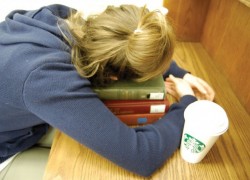
Some students might think that staying awake all night to finish a project or study for a test only means a day or two of exhaustion, but doing so could result in dropped GPAs.
Dr. Stephen Rodgers, the medical director for the James Madison U. Health Center, has the science to back it up. He said recent studies prove that students with less sleep have lower GPAs than students who do get sleep.
“The mean GPA for students is 2.8, but for sleep-deprived students, it’s 2.65,” Rodgers said.
Only 11.4 percent of students in the past week have gotten enough sleep to feel rested, according to the 2011 health survey by the American College Health Association.
One contributor to this pervasive sleepiness might be all-nighters. They may be a great way to cram for exams, but all-nighters aren’t exactly the best idea. Lack of sleep causes depression and irritability, which affects the brain’s ability to retain information, Rodgers explained.
A crucial part of adding new information to memory is the part of the sleep cycle called rapid eye movement sleep. During REM sleep, the brain embeds the information it’s taken the day before.
Without REM sleep, the brain can’t perform up to its full ability or retain memory.
Jeff Dyche, a JMU psychology professor, said that cramming limits the amount of information the brain can actually learn due to an enzyme produced called protein phosphatase 1.
“It is a molecular constraint to learning,” Dyche said. “In other words, it keeps you from learning things very well. The only way to avoid this is to distribute your studying over a long period of time.”
Caffeine, after a certain point, doesn’t help either.
“Up to three cups of coffee or soda would help performance,” Rodgers said, “but anything more than that would lead to a crash and then more drowsiness the next day during a test.”
Some students said exam week was the most popular time to pull all-nighters.
JMU sophomore Katie Dudek has gone a few sleepless nights to study for exams.
“I have done maybe eight total, and it was during midterm and finals time,” Dudek said. “The most I’ve ever done is two nights in a row, but I had naps during the day. It was finals week.”
JMU freshman Nick Minahan said all-nighters are a necessary evil. He said he gets hit harder with tests and projects on some weeks more than others.
“I feel as if all-nighters aren’t even optional at times, especially around midterms,” Minahan said. “So with that said, they’re worth it because it’s the only way I can complete my work and study an adequate amount.”
Dyche hopes to dispel the popularity of all-nighters.
“I think there are students who think they haven’t studied enough unless they pull an all- nighter,” Dyche said, “so they think it is a requirement or something.”
